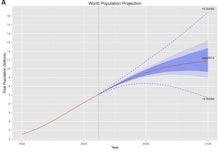Here's What the World's Population Will Look Like in 2100

The news: Globalization might make the world feel smaller — but in reality, it's getting bigger every day, and it's not stopping soon.
According to a new study published by Science and carried out by the United Nations and the University of Washington, it's unlikely for global population growth to stop during this century. In fact, despite previous research that suggests the population will peak around 9 billion people by 2050, researchers now believe there's an 80% probability that the planet will reach between 9.6 and 12.3 billion people by the year 2100.
Why is this happening? Much of this increase can be traced back to Africa. While fertility rates there have been declining like in the rest of the world, they are doing so at a slower speed than previously anticipated by demographers.
"Fertility levels turn out to be higher today than was expected 10 years ago," John Wilmoth, director of the United Nations' Population Division and co-author of the paper, told Al Jazeera. "There's been a worldwide reduction in fertility, even in sub-Saharan Africa over the last two decades. It's falling, but slower than expected and more slowly than in other countries in Asia and Latin America."
According to the paper's projections, the population in Africa will multiply from 1 billion to 4 billion by 2100. In comparison, Asia is expected to peak at 5 billion in 2050 and slowly decline, while populations in North America, Europe and Latin America/Caribbean are all expected to stay under 1 billion people each.
What does this mean? The study is based on new statistical models using data on population, fertility, mortality and migration — and is likely the most comprehensive population growth research to date. "Earlier projections were strictly based on scenarios, so there was no uncertainty," said U.N. demographer Patrick Gerland in a press release. "This work provides a more statistically driven assessment that allows us to quantify the predictions, and offer a confidence interval that could be useful in planning."
The question now is how the planet can limit population growth and provide enough resources to accommodate it. The researchers put together some recommendations, such as strengthening policies in Africa to lower fertility rates, especially focusing on better access to contraceptives and education for girls and women.
But this isn't just a problem for Africa, but for the rest of the world. If population growth continues in Africa, it will be a strain on everyone's resources — and it's a good reason why we need to start worrying about it sooner than later.